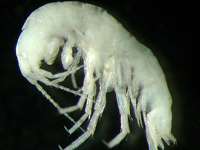Stygobromus kenki facts for kids
Quick facts for kids Stygobromus kenki |
|
|---|---|
 |
|
| Conservation status | |
| Scientific classification | |
| Kingdom: | |
| Phylum: | |
| Subphylum: | |
| Class: | |
| Order: | |
| Family: |
Crangonyctidae
|
| Genus: |
Stygobromus
|
| Species: |
S. kenki
|
| Binomial name | |
| Stygobromus kenki (Holsinger, 1978)
|
|
Stygobromus kenki is a very rare type of amphipod. Amphipods are small crustaceans, like tiny shrimp. This species is also known as Kenk's amphipod, Rock Creek groundwater amphipod, or Rock Creek stygobromid.
Contents
Meet Kenk's Amphipod!
Kenk's amphipod is a unique creature. It lives only in a small area of the United States. Scientists study it to understand more about rare freshwater animals.
Where Does It Live?
This special amphipod can only be found in parts of Washington, D.C. and Montgomery County, Maryland. It lives in the Potomac River watershed. A watershed is an area of land where all the water drains into one main river.
Its entire home area is quite small, less than 40 square miles. So far, it has only been found in five places. These spots are usually springs or seeps in local waterways.
What Does It Look Like?
Kenk's amphipod is very tiny. The biggest females are about 5.5 millimeters long. That's about the size of a small ant! The largest males are even smaller, around 3.7 millimeters.
Because they are so small, you need a microscope to see them clearly. To identify them, scientists often have to examine them very closely. This process can harm the amphipod. Because they are so rare, scientists try not to identify them unless it's absolutely necessary.
Its Home Environment
This amphipod lives in freshwater habitats. You can find it in and near water. It likes to hide in detritus, which is bits of dead plants and animals. It also lives in the sediment, which is mud or sand at the bottom of the water. It prefers areas around springs and seeps.
How Was It Discovered?
The first time this amphipod was found was in 1967. It was discovered in Rock Creek Park by a scientist named Roman Kenk. Later, in 1978, another scientist named J. R. Holsinger named the species Stygobromus kenki after Roman Kenk.
Friends and Neighbors
Interestingly, Kenk's amphipod sometimes shares its home with another rare amphipod. This other species is called Stygobromus hayi. It belongs to the same genus, Stygobromus.
 | Sharif Bey |
 | Hale Woodruff |
 | Richmond Barthé |
 | Purvis Young |


